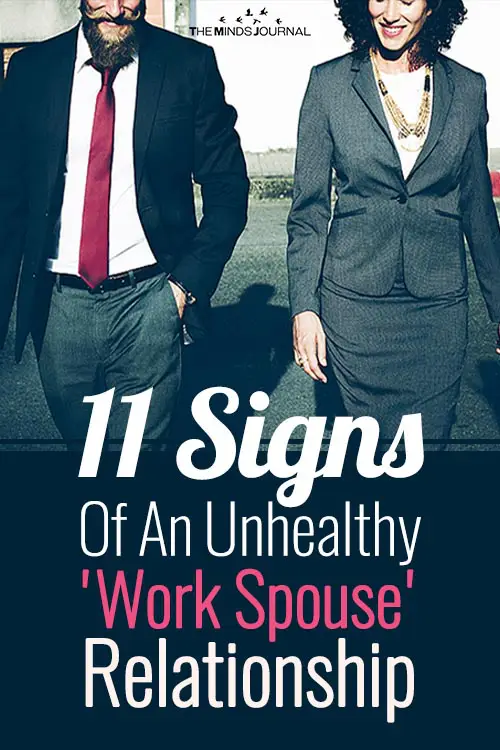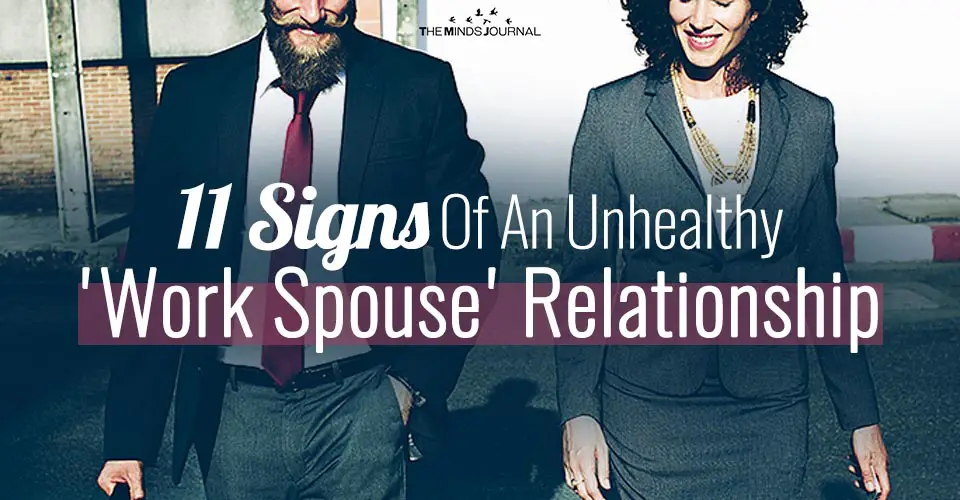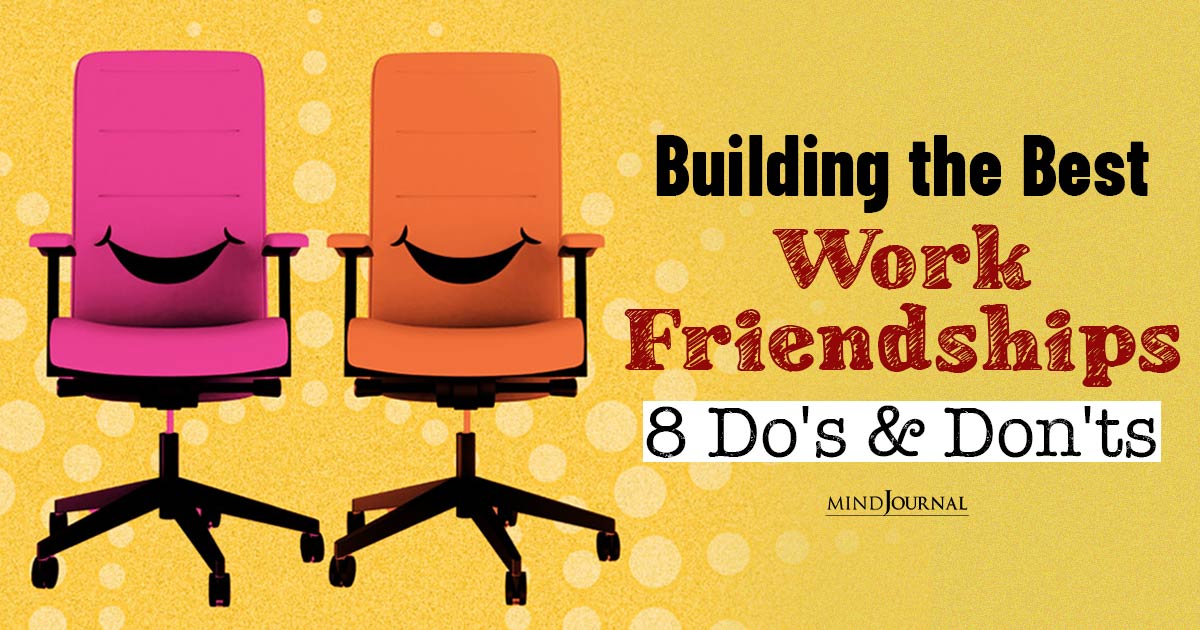What defines an Unhealthy Work Spouse Relationship? Do you have a new bestie in the office? Have you formed a close friendship with a coworker? Then it’s likely you have a “work spouse.” It refers to a strong platonic relationship between colleagues of the opposite sex.
Usually, a work spouse can help make work pressure more tolerable and increase productivity. But when you start ignoring your actual spouse and cross boundaries with your office spouse, then it can get unhealthy really fast.
“In a lot of work places, you work at a lot of jobs and people work more with their colleagues than with their family.” – Russell Hornsby
Are You Having an Emotional Affair with Your ‘Work Spouse’?
Are you in a stable, committed, long-term relationship, but admittedly have a “work spouse”? Having a “work wife” or “work husband” is a common thing in society today. But, what if sometimes your “work spouse” relationship makes you or your coworkers uncomfortable? Assuming there is zero physical flirtation to take into consideration, how do you know where the line is? Sometimes, even just an appearance of impropriety can damage your reputation at work and at home. so, it is important to know the signs of inappropriate work relationship.
11 Signs Of An Unhealthy ‘Work Spouse’ Relationship
Here are 11 things to ask yourself to decide whether you might be stepping over the bounds of an appropriate workplace relationship:
1. Your partner is no longer the first person you’re excited to tell things to, and you often assume you’ve already told them about “x.” In reality, you already told your “work wife” because of your close working relationship, and assume that you told your partner as well.
2. Rather than doing things to impress your partner, you do them to impress your “work spouse.” Example: you’re usually pretty frugal & don’t buy little indulgences often, but around your work wife, you want to show them you support what they support, so you buy girl scout cookies from a random girl scout, despite already having purchased some from the work wife’s kid. Or, you’re not someone who typically gives bums any spare change, but you find yourself doling out $10 at an on ramp with your work wife in the car on the way to a job site.
3. The idea of losing your actual partner doesn’t bother you because you know your work partner will be there to support you and help you through it. They’ll also help you justify your actions in the primary relationship’s breakdown.
4. You find yourself wishing that your partner would be more like your work partner. Perhaps, you lose sight of the fact that your “work wife” can’t afford to lose her cool at work and show how she honestly feels, while your partner at home feels safe enough around you to show their real emotions.
5. You discuss inappropriate things with your work wife, such as your actual relationship. You also talk about things you should instead ask your partner about instead of the work wife.
6. Your work wife/husband is very flirtatious and often brings up sexual things in conversations where they have no place. Example: you’re a banker, and they talk about leaving their spouse, but only if the person they leave them for has a “very big weiner…etc.”
7. Your work wife is more “needy” and “vulnerable” than your partner, so you find yourself being compelled to cater to them and thinking they need you. This might cause you to start ignoring your actual partner’s needs because they seem so small in comparison to all that your work spouse requires.
8. You start expecting your partner at home to “read your mind” more often, such as assuming they’ll realize what you want them to do, even regarding topics that have never been approached. Have you lost sight of the fact that communication at work has to be direct, face-to-face, and clear, or the project will stall? While at home, it’s much more comfortable to assume things than confront them.
“It’s easy to deny the seriousness of an emotional affair but it can be extremely threatening to a marriage.” – Dr. Gail
9. You justify your work partner’s actions and defend them at every opportunity, even when there is no attack on them by anyone.
10. Inside, you may realize you’re overly protective of your “work spouse,” but justify it by telling yourself it’s just your job and you can’t afford to damage your working relationship.
11. You feel like it is not “real cheating” because you would never physically cheat, or there’s a big age gap or any seemingly plausible, but actually entirely superficial excuse because if you’re emotionally closer to someone besides your partner, there is an issue.
If you agreed with one or two of the above statements, you’re probably in the clear. After all, you can only talk about work so much, and inquiring about other people’s lives is normal, natural, healthy, and contributes to a friendlier work environment. No one wants to work somewhere, where no one cares about their family life, or they feel like they can’t be themselves.
However, if you agreed with the majority of all of the 11 statements, you might want to:
- Come clean with yourself.
- Come clean with your partner before irreparable damage occurs, and
- Have a talk with your “work spouse” to set more appropriate boundaries before either of you take it too far.
The last thing you want to do is damage the trust you have at home via an inappropriate work relationship or to damage your career through the appearance of an inappropriate relationship.
“When a man must force himself to be faithful in his love, this is hardly better than unfaithfulness.” – Francois La Rochefoucauld
Here’s an interesting video that you may want to check out:
Be smart and sensitive
Work spouses are just really good friends who work together. But such a friendship can easily take a wrong turn if you’re not careful enough. It primarily depends on what you and your coworker think about this friendship and what you expect from it as a team. If you’re on the same page, then this relationship can be an asset for both of you and can be sustainable.
However, if you or your “work friend” have any ulterior motive then things can get negative before you may realize. It’s better to question your intentions and understand theirs before you further invest yourself into this relationship.
“Spouses in healthy relationships cherish each other’s space and are champions of each other’s causes.” – Henry Cloud
Remember that by investing too much into your friendship with your “work spouse”, you’re putting your real relationship with your actual spouse in jeopardy. So make sure to weigh in both the pros and cons before moving ahead. Understand that if you talk about your office friend frequently at home, it’s natural for your husband or wife to feel jealous and left out. This may lead to doubts and create cracks in your marriage or relationship.
The best thing you can do to clear the air is to introduce your “work spouse” to your real spouse. This will help your husband or wife to realize that this is a healthy friendship and you’re not cheating on them. Set up a double date with your work spouse and their real partner and grab some drinks or invite them over for dinner. This will help you create a better relationship with both your own spouse and your office bestie.
With some tact and sensitivity, you can build a lifelong friendship with your colleague, strengthen your marriage and make work more enjoyable.
Written by Sarah Smith
Originally appeared in The Goodmen Project
You may also like:
- When Your Spouse Is Also Your Co worker – The Ups and The Downs
- 3 Guidelines for Spouses Affected by Their Partner’s Addiction
- 6 Harsh Realities of Life After Divorce From A Narcissist
- 7 Most Important Qualities That Keep Married Couples Together For The Long Haul









Leave a Reply
You must be logged in to post a comment.